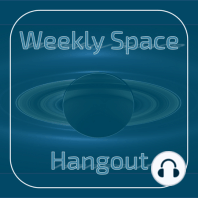50 min listen

Weekly Space Hangout — June 15, 2022: CREW HaT: An Answer to Radiation Shielding? with NIAC 2022 Awardee Dr. Elena D’Onghia
Weekly Space Hangout — June 15, 2022: CREW HaT: An Answer to Radiation Shielding? with NIAC 2022 Awardee Dr. Elena D’Onghia
ratings:
Length:
57 minutes
Released:
Jun 17, 2022
Format:
Podcast episode
Description
As humanity dreams of exploring destinations both within our own solar system as well as those far beyond, the greatest challenge to be overcome is how to provide effective protection against the inevitable, prolonged exposure to lethal levels of radiation. We all know that Earth's strong magnetic field continually protects us. But can a sufficiently strong magnetic field be generated aboard a spacecraft? 2022 NIAC winner Dr. Elena D'Onghia joins us tonight to discuss a new concept that may just be the solution we need! Elena is an associate professor at the University of Wisconsin–Madison's Department of Astronomy, and the principal investigator for this innovative concept called CREW HaT which stands for Cosmic Radiation Extended Warding using the Halbach Torus. The project, which has been awarded funding from NASA Innovative Advanced Concepts (NIAC), incorporates superconductive tape technology, a deployable design, and a Halbach Torus (shown in tonight's thumbnail). The Halbach Torus is a circular array of magnets that generates an asymmetric magnetic field with an enhanced magnetic field outside of a spacecraft that diverts cosmic radiation particles and a suppressed magnetic field within the astronaut's habitat. To learn more about CREW Hat visit their NIAC page here: https://www.nasa.gov/directorates/spacetech/niac/2022/CREW_HaT/ You can also read more about it here: https://phys.org/news/2022-05-magnetic-astronauts-dangerous-space.html Dr. Elena D'Onghia is an Associate Professor in the Astronomy Department at the University of Wisconsin-Madison. Prior to joining UWM, she was a Postdoctoral Researcher at the Harvard-Smithsonian Center for Astrophysics. Elena's research combines unique analytic models and high-resolution numerical simulations to get new insights into the dynamical processes that form the stellar skeleton of our Galaxy. You can learn more about Elena on her UWM faculty page here: http://www.astro.wisc.edu/our-people/faculty/donghia-elena/. And be sure to check out the Mad Astro Dynamics Research Group at UWM here: https://www.madastrodynamics.com/ **************************************** The Weekly Space Hangout is a production of CosmoQuest. Want to support CosmoQuest? Here are some specific ways you can help: Subscribe FREE to our YouTube channel at https://www.youtube.com/c/cosmoquest Subscribe to our podcasts Astronomy Cast and Daily Space where ever you get your podcasts! Watch our streams over on Twitch at https://www.twitch.tv/cosmoquestx – follow and subscribe! Become a Patreon of CosmoQuest https://www.patreon.com/cosmoquestx Become a Patreon of Astronomy Cast https://www.patreon.com/astronomycast Buy stuff from our Redbubble https://www.redbubble.com/people/cosmoquestx Join our Discord server for CosmoQuest - https://discord.gg/X8rw4vv Join the Weekly Space Hangout Crew! - http://www.wshcrew.space/ Don't forget to like and subscribe! Plus we love being shared out to new people, so tweet, comment, review us... all the free things you can do to help bring science into people's lives.
Released:
Jun 17, 2022
Format:
Podcast episode
Titles in the series (79)
Weekly Space Hangout: May 26, 2021 – Looking for Microbial Life in Space With Dr. Jay L. Nadeau: This week we welcome Dr. Jay L. Nadeau to the Weekly Space Hangout. Jay is an Associate Professor in the Physics department at Portland State University and the founder of the Nadeau Lab (https://motility.research.pdx.edu/index.html) where they... by Weekly Space Hangout